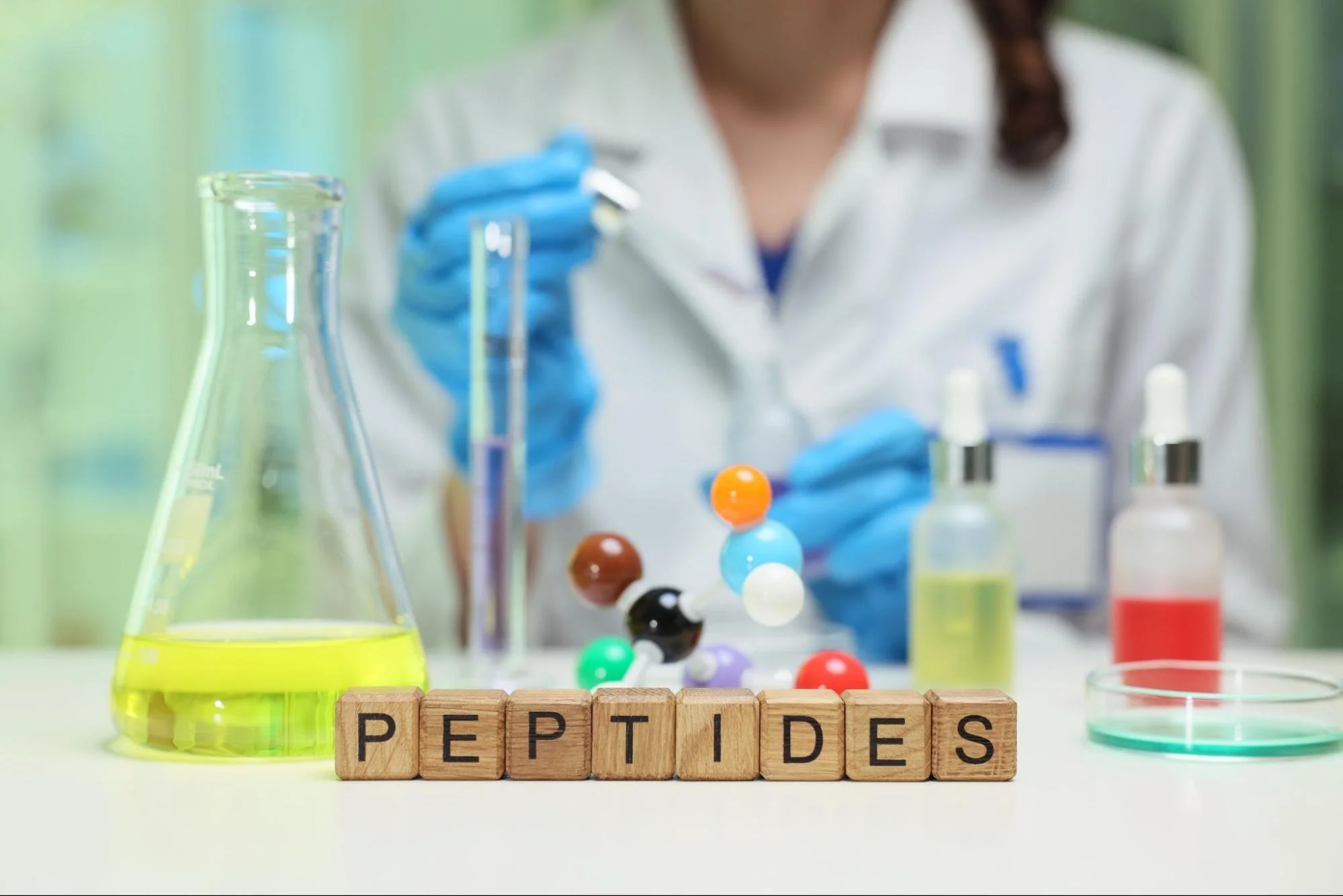What Are Peptides and Which Are Most Commonly Used?
Last Updated: November 2025
Overview
Peptides are short amino acid chains that act as messengers in your body.
They can influence metabolism, healing, inflammation, and hormone balance.
Five widely discussed peptides include insulin, GLP-1, BPC-157, KPV, and Thymosin Beta-4.
Safe use requires medical supervision and evidence-based dosing.
At HealthSpan Internal Medicine in Boulder, CO, peptide therapy is physician-led and grounded in science.
Key Points
Peptides are small proteins that help regulate body functions like blood sugar, healing, and immunity.
They are used for weight management, hormone signaling, tissue repair, and inflammation reduction.
Peptides should always be prescribed and monitored by a qualified clinician.
Choose reputable sources and avoid unverified online sellers.
Benefits often appear within weeks, but consistent use under supervision is key.
They can be delivered as injections, pills, or creams depending on the type.
Regular labs and follow-ups are important for safety and effectiveness.
Let’s Break This Down Simply
Peptides are like “cellular text messages.” They carry instructions that influence how your body heals, burns fat, produces hormones, or controls inflammation. Because they act on specific receptors, they can have very targeted effects with fewer side effects than some medications.
Scientists and clinicians have developed therapeutic peptides to mimic natural ones—so your body gets the same signal in a controlled, predictable way. Some, like insulin, are essential life-saving treatments. Others, like BPC-157 and Thymosin Beta-4, are being studied for healing and recovery support.
What are Peptides
Peptides are short chains of amino acids—the same building blocks that make up proteins in your body. Think of them as small messengers that tell your cells what to do: heal tissue, balance hormones, regulate metabolism, or reduce inflammation. Some peptides occur naturally in the body, while others are made synthetically to mimic or enhance natural functions.
Below, we’ll explain what peptides are, how they’re used in medicine, and highlight five of the most recognized peptides today: insulin, GLP-1, BPC-157, KPV, and Thymosin Beta-4.
Who They Help (and Who Should Avoid Them)
Peptide therapy may benefit:
Adults managing metabolic health, inflammation, or slow tissue recovery
Those with midlife hormone shifts or declining vitality
Patients seeking physician-supervised, evidence-based longevity support
Avoid or use with caution if:
You are pregnant or breastfeeding
You have uncontrolled cancer or autoimmune disease
You use unregulated peptides from unverified sources
Your clinician can determine whether peptides are appropriate based on labs, history, and medications.
The Top 5 Most Commonly Used Peptides
Insulin
Perhaps the most famous peptide, insulin regulates blood sugar by helping glucose enter cells for energy. It’s essential for diabetes management and remains the gold standard in peptide-based medicine.GLP-1 (Glucagon-Like Peptide-1)
GLP-1 helps regulate blood sugar and appetite. Synthetic versions like semaglutide (Ozempic) and liraglutide (Victoza) are FDA-approved for diabetes and weight management.BPC-157 (Body Protection Compound-157)
BPC-157 is studied for tissue repair and inflammation reduction. It shows promise in healing and recovery but is not FDA-approved. Only use under medical supervision.KPV (Lysine–Proline–Valine)
KPV has anti-inflammatory and gut-supporting effects. It may help calm immune responses and reduce intestinal inflammation, though human studies are limited.Thymosin Beta-4 (TB-4)
TB-4 supports tissue regeneration and cellular repair. Some clinics use TB-500, a synthetic version, for injury recovery. Use only from trusted medical sources with proper guidance.
Expected Timeline, Monitoring & Follow-Up
Most patients notice early improvements—like better energy or healing—within 4 to 8 weeks.
Treatment cycles often last 3 to 6 months, depending on goals.
Monitoring typically includes:
Baseline labs (glucose, liver, kidney, lipids)
Follow-ups every 8–12 weeks
Tracking progress and side effects
Peptide therapy is not one-size-fits-all. Dosing and type are adjusted for safety and results.
Risks, Side Effects & Safety
Common side effects:
Mild injection site redness for injectible versions—oral are another option without this side effect
Headaches or dizziness
Digestive changes (nausea, bloating, or appetite shifts)
Seek medical help immediately if you experience:
Chest pain, shortness of breath, or swelling
Severe abdominal pain or vomiting
Allergic reaction (rash, swelling, or trouble breathing)
Always use peptides prescribed and dispensed by a licensed provider. Avoid “research-only” or online sellers to prevent contamination risks.
How We Approach Peptide Therapy at HealthSpan Internal Medicine
At HealthSpan Internal Medicine in Boulder, CO, we provide evidence-based, physician-supervised peptide therapy designed around your goals.
Our approach includes:
Comprehensive intake and medical history review
Baseline testing for hormones, inflammation, and metabolism
Personalized dosing and compound selection
Regular follow-ups to track results
Integration with nutrition, exercise, and stress management
Our goal is to help you age well, recover faster, and maintain vitality—safely.
When To Seek Care
Contact your clinician or go to urgent care if you experience:
Sudden chest pain, shortness of breath, or fainting
Severe abdominal pain or persistent vomiting
Rash, swelling, or trouble breathing
Vision changes or severe headaches
Ready to take action for your brain health?
👉 Join the 12-week Brainspan Bootcamp and start building lifelong brain resilience
Sources
Nature Communications – “Therapeutic peptides: current applications and future directions”
Medical News Today – “Peptides: What they are, uses, and side effects”
Verywell Health – “Understanding Peptides: Different Types, and What They Do”
Medically reviewed by
Dr. Jessica Knape, MD, MA Board Certified in Internal Medicine and Integrative and Holistic Medicine
Healthspan Internal Medicine — serving patients in Boulder, CO
Book a Discovery Call | About Dr. Knape
This content is for educational purposes and does not replace personalized medical advice.

